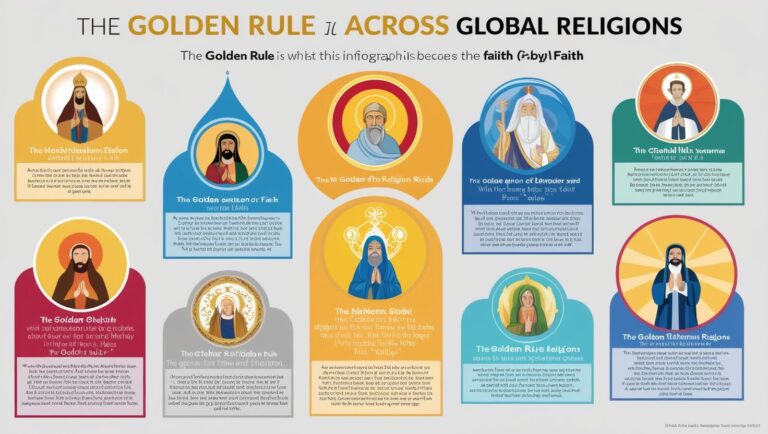In a world bursting with diverse cultures and belief systems, one might wonder if there’s a common thread that unites them all. While the differences can be stark, there’s a surprisingly universal principle that emerges across global religions: the Golden Rule. This ethical guideline encourages individuals to treat others as they themselves would wish to be treated. Despite varying interpretations and expressions, the Golden Rule stands as a beacon of empathy and mutual respect across faiths. Let’s delve into how this powerful concept manifests in different religions and explore its call for universal kindness.
Discovering The Golden Rule Across Religions
The Golden Rule might sound like a simple axiom, but its reach is profound, echoing through the sacred texts and teachings of many of the world’s major religions. In Christianity, the rule is prominently stated in the Bible’s New Testament: “Do unto others as you would have them do unto you” (Matthew 7:12). This principle is foundational, serving as a guiding tenet for Christian moral behavior and interpersonal interactions. Similarly, in Judaism, the Talmud articulates a comparable ethic: “What is hateful to you, do not do to your neighbor. This is the whole Torah; the rest is commentary.”
In Islam, the Prophet Muhammad emphasized treating others with compassion and respect, saying, “None of you truly believes until he loves for his brother what he loves for himself.” This sentiment underscores the importance of empathy and consideration in fostering a harmonious community according to Islamic teachings. Buddhism, too, holds the essence of the Golden Rule, although it slightly shifts the focus to personal responsibility: “Hurt not others in ways that you yourself would find hurtful.” This directive encourages Buddhists to remain mindful of their actions’ impact on others.
In Hinduism, the Golden Rule is embedded in the ancient Sanskrit texts, reflecting the deep-rooted culture of non-violence and interconnectedness. The Mahabharata states, “This is the sum of duty: do not do to others what would cause pain if done to you.” Hinduism’s approach integrates the rule into the broader principle of dharma, emphasizing righteous living and moral duty. Across these varied religious landscapes, the Golden Rule emerges as a shared moral compass, bridging disparate belief systems with a common call for ethical conduct.
How Different Faiths Preach Universal Kindness
The message of the Golden Rule extends beyond mere religious doctrine, often finding expression in the everyday lives of its followers. In Christianity, acts of charity and service are encouraged as a reflection of Christ’s love, embodying the Golden Rule in real-life contexts. Similarly, in Judaism, the practice of “tikkun olam,” or repairing the world, calls on individuals to engage in social justice and community service, extending kindness and fairness to all.
In Islam, the principle of “sadaqah,” voluntary charity, embodies the ethos of treating others as one would like to be treated. Muslims are encouraged to share their wealth and resources with those less fortunate, reinforcing a community built on empathy and generosity. For Buddhists, the practice of “mettā,” or loving-kindness meditation, is a direct cultivation of goodwill towards others, promoting a compassionate mindset that aligns with the Golden Rule.
Hinduism’s emphasis on “ahimsa,” or non-violence, further exemplifies the Golden Rule’s reach in everyday actions. Hindus are encouraged to practice kindness and avoid causing harm, whether through thoughts, words, or deeds. These practices across different faiths illustrate how the Golden Rule not only serves as a spiritual ideal but also as a practical guide for nurturing harmony and understanding in an often divided world.
The Golden Rule’s presence across global religions showcases a remarkable convergence of moral teachings, revealing a shared human inclination towards empathy and respect. By encouraging us to consider the impact of our actions on others, this timeless principle fosters a spirit of compassion that transcends religious and cultural boundaries. As we navigate the complexities of modern life, the Golden Rule provides a simple yet profound reminder of our interconnectedness. Embracing this universal ethic can inspire us to build more understanding communities, where kindness and mutual respect reign supreme.

















